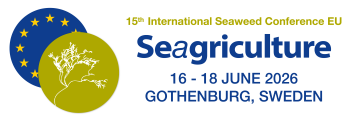Focus on a session: Session 6, large-scale seaweed production
Seagriculture 2016 will cover a wide range of topics, from seaweed biology in session 1, certification in session 2, the economics and the technology behind seaweed farming in sessions 3 and 4, high-end applications of seaweed in session 5, and large-scale seaweed production in session 6. Today, we'll look into what Session 6 has to offer!
[caption id="attachment_1696" align="alignright" width="679"]
 The speakers of session 6: Jacques Mazoyer, Pi Nyvall Collén, Philippe Lavoisier and Tom Wijers[/caption]
The speakers of session 6: Jacques Mazoyer, Pi Nyvall Collén, Philippe Lavoisier and Tom Wijers[/caption]Jaques Mazoyer (Cargill) kicks off the session: he will unveil what makes seaweed a reliable, sustainable and profitable raw material for carrageenan production, to help us ultimately make this supply chain viable on the long term.
Pi Nyvall Collén (Olmix) follows with her take on how to improve the conversion of animal feed making use of seaweed extracts.
More specifically, she will go into the results of a trial where a combination of green- and red seaweed extracts with micronized clay were added to a standard pig diet to increase digestibility. The addition did indeed have positive effects on the digestibility, energy utilization and bioavailability of proteins.
You can read an interview with Pi here by the way!
Third in line is Philippe Lavoisier (ERANOVA), who has more than 25 years of experience in the plastic packaging industry. From 2010, he has been working on odor- and colorless bioplastics from macroalgae, which is why we invited him to speak at Seagriculture!
In his talk, he will among other things go into the composition of their ALGAE EXTRACT, which is high in starch, Ulvane and minerals, but low in proteins. The latter is especially important as the heating required to produce bioplastics causes proteins to discolour and produce an undesirable odor.
With Van Hall Larenstein’s Tom Wijers talk we return to the seaweed-for-feed topic. But, contrary to Pi, Tom will go into seaweed as an alternative protein source for the aquaculture industry, and fish feed in particular. The fish feed used today depends on key component fish meal, which is produced from wild-caught fish. Sustainable growth of the sector is only possible if we can move away from fishmeal; the ZEEVIVO project investigates if and which seaweed species and bio-refinery method result can lead to a sustainable fish meal alternative.
